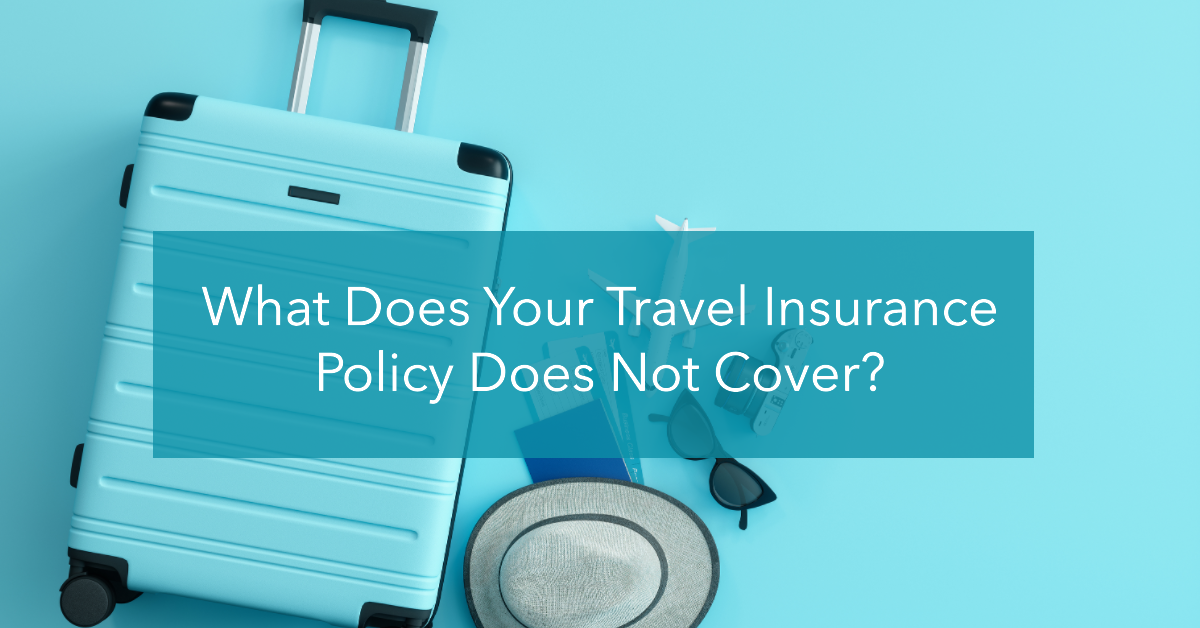Insurance
Here Are Lists Of What Travel Insurance Does Not Cover

When you buy travel insurance, you may assume it will cover any injury, illness, inconvenience, or loss you experience during your trip, but as with any insurance, it’s important to read your policy. There’s a long list of things travel insurance won’t cover, some of which may surprise you.
1. Fear of Travel Due to a Pandemic, Outbreak or Other Reason
A regular travel insurance coverage won’t help you cancel a trip to a pandemic hotspot because you’re afraid of becoming sick. Should you become uncomfortable flying, typical trip cancellation travel insurance doesn’t cover that either.
To be compensated for pre-paid and non-refundable trip expenses, you must cancel for a reason stated in your policy, such as a family member’s death, jury duty, or a job loss. A more expensive workaround exists.
Travel insurance offers “cancel for any reason” coverage. This coverage lets you cancel your vacation for any reason. Cancelling at least 48 hours before departure usually gets you 75% of your pre-paid charges returned.
“Cancel for any reason” coverage adds 50% to travel insurance costs but may be worth it for flexibility.
2. Natural Disasters That Begin Before You Buy Travel Insurance
If you fear that a brewing hurricane will disrupt your trip, you must purchase travel insurance before the storm is named in order to be protected for any resulting damages.
“Once a storm is named, it’s too late to buy travel insurance to cover it,” Allianz Travel spokesperson Daniel Durazo said.
The same can be said for other natural disasters. If a volcano begins to erupt, you’ve missed the opportunity to purchase travel insurance that covers volcano-related trip cancellation.
3. Some Last-Minute Changes Aren’t Covered by Travel Insurance
Say your cruise itinerary changes at the last minute and you decide you’d rather not sail. Your travel insurance won’t be of any assistance in this scenario.
Even “cancel for any reason” travel insurance requires you to cancel at least 48 hours before your trip, which doesn’t help if your decision to stay home is truly last minute.
4. Bad Weather and Trip Cancellation, Trip Interruption Insurance
With ordinary travel insurance, learning it will rain all week on your beach holiday is not grounds for cancellation. If you contact 48 hours before departure, only “cancel for any reason” coverage will help.
Travel insurance for “interruption for any reason” is another choice. This lets you abandon a journey midway and return home early. This optional benefit can reimburse 75% of pre-paid, non-refundable trip fees if you’re tired of rainy vacations.
To qualify for “Interruption for any reason” coverage, you must insure 100% of your trip and pay 3% to 10% more. Cancelling 48 hours or more before your travel is eligible for a claim.
5. Pre-existing Medical Conditions and Travel Insurance
This is important because many adult travelers have pre-existing medical conditions. If your asthma flares up on vacation and you don’t have a pre-existing medical condition waiver, guess what? Travel medical insurance may not cover you.
When you claim hospital bills, your travel insurance company may review your medical records. Your claim may be denied if it finds a medical history during the “look-back period” (60, 90, or 180 days before you acquired the insurance).
If your illness worsens while traveling, your waiver will cover X-rays, lab work, prescription, hospital, and doctor fees up to your policy limits.
Company policies on pre-existing conditions vary. Travel insurance companies may define pre-existing conditions differently. Always read waivers when obtaining travel insurance.
A pre-existing medical condition exclusion waiver is usually available within 14 to 21 days of paying a trip deposit and insuring the full non-refundable fees. Travel insurance usually requires medical fitness.
6. Normal Pregnancy Not Covered by Travel Insurance
If you become pregnant after buying travel insurance, you may be allowed to cancel. You must produce medical papers showing that the pregnancy began after the purchase date for your trip cancellation insurance to compensate you.
Even with a pre-existing medical condition exclusion waiver, typical pregnancy care may not be covered if you travel.
Some policies cover pregnancy problems. A doctor-documented trip interruption insurance claim may be available if you experience pregnancy-related health difficulties while traveling. The company and plan you buy determine this.
Consult a travel counselor or insurance agent if you’re pregnant or considering a pregnancy vacation. For early-booked cruises, this is crucial.
7. Activities That Involve Drinking or Drug Use
Most travel insurance plans won’t cover accidents or injuries that happen as a result of intoxication or drug use.
If you go on a pedal-powered beer bike tour and fall into the street after a few beers, your medical bills won’t be covered by your travel medical insurance. And if your purse gets stolen while you are enjoying the all-inclusive beverage benefits at a resort, don’t expect to file a successful claim.
8. Risky Activities and Sports Often Excluded from Travel Insurance
Skiing, jet-skiing, mountain climbing, and deep-sea scuba diving are high-risk hobbies that many travel insurance providers restrict. Check your policy’s fine print before buying to see what’s covered.
No worries about adventurous sports and activities coverage. Travel insurance providers often charge extra for sports and adventure. World Nomads, an adventure sports travel insurance business, is another option.
Know your travel medical insurance and medical evacuation travel insurance restrictions. Lounging on a distant island may not seem perilous, but being bitten by a snake and sent to a hospital may be pricey.
9. Illegal or Dangerous Activities
If you are hurt doing anything dangerous, like flying in a private plane, your travel insurance won’t cover it. Reason: You promised the insurance not to take needless risks in your contract.
Not covered either? Motorcycling or scootering without a license is unlawful. You cannot pursue a travel insurance claim if you caused an accident at the wheel.
Medical Tourism and Travel Insurance
Are you going on vacation for a facelift or a tummy tuck? Don’t look to travel insurance for help with the hospital bills or aftercare. Medical tourism is a common exclusion.
Anything Not Well Documented
When you file a travel insurance claim, you will be asked to include documentation. Without a paper trail of your losses, they may not be reimbursed.
Here are some scenarios that would require documentation:
- Trip Cancellation: You get Covid-19 and need to cancel your upcoming trip. Visit a doctor for a test and provide your travel insurance company with a doctor’s note stating you are unfit to travel. A home test is likely not enough for a trip cancellation insurance claim.
- Travel delay: Your flight is delayed overnight and you’d like reimbursement for the last-minute hotel you had to book. Get proof of the delay from the airline to file a travel delay insurance claim.
- Baggage loss: After arriving at your destination, your backpack is stolen and you want to file a baggage loss travel insurance claim. File a police report or request documentation signed by your tour organizer or hotel manager. Collect any receipts you have for lost items listed in your claim and submit those as well.
- Trip Interruption: While traveling, you become severely ill and want to go home early. Make an appointment with a local doctor and ask for a written copy of the diagnosis. Your word that you didn’t feel well is likely not enough to file a successful trip interruption insurance claim—you usually must have documentation from a physician.
Not having proper documentation may result in your claim being delayed or denied. James Page, a spokesperson for AIG Travel, says the claims process is often impeded by “the policyholder not providing sufficient documentation to demonstrate their actual financial loss, thereby allowing the insurer to fully evaluate the claim.”
Anything Not Mentioned in the Policy
It’s important to read the fine print of your travel insurance policy. Anything not explicitly mentioned as covered in a travel insurance policy probably isn’t.
Common travel insurance exclusions
Look for the exclusions listed in your plan. Common exclusions include:
- Routine physicals
- Routine dental care
- Physical therapy
- Mental health care
- Losses due to nervous disorders like anxiety or depression
- Losses caused by intentional self-harm, including suicide
- Losses due to war, civil disorder and riots
Free look period for travel insurance
When purchasing travel insurance, take advantage of the free look time. If the policy does not fit your needs, you have a specific number of days to cancel it and obtain a full refund. Use this time to read the plan thoroughly and understand your benefits. If you have any questions regarding your coverage, contact a travel specialist or an insurance representative.
Travel Cards That Offer Insurance Benefits
1. Chase Sapphire Preferred® Card:
- Welcome Bonus – 60,000 bonus points
- Annual Fee – $95
- Credit Score – Excellent, Good
- Regular APR – 21.49%-28.49% Variable
2. Capital One Venture X Rewards Credit Card
- Welcome Bonus – 75,000 miles
- Annual Fee – $395
- Credit Score – Excellent
- Regular APR – 21.99% – 28.99% (Variable)
- Welcome Bonus – 60,000 bonus points
- Annual Fee – $550
- Credit Score – Excellent
- Regular APR – 22.49%-29.49% Variable






















